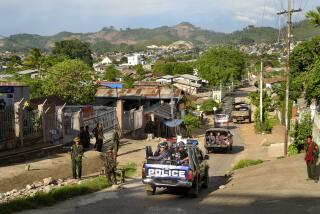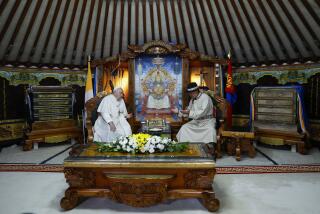Ghenghis Khan Successors Hunt for a Mission : Mongolia: The nation’s army is all set for war--but it’s missing an enemy. As tensions in the region ease, these legendary warriors go looking for busywork.
- Share via
SONGINO, Mongolia — With a commanding view of the green grasslands and gentle mountains of central Mongolia, the Mongolian army’s 276th Artillery Regiment stands always ready for war.
An arsenal of AK-47 assault rifles is closeted in the regiment’s spartan barracks at its headquarters in Songino, kept close at hand to rows of army cots. A dilapidated garage hides five Soviet-made mobile rocket launchers. Armed guards patrol the camp’s barbed-wire perimeter.
The base and its field artillery protect the main highway to the capital, Ulan Bator, 30 miles to the northwest, and would be among the last lines of defense in repelling an invasion.
But the camp’s officers and men have a problem these days: identifying just who the invaders might be.
“That is difficult to say,” shrugged the base commander, Lt. Col. D. Amgaabasaar, when foreign reporters visited recently. “The Mongolian people do not consider any nation their enemy.”
Eight centuries after the warrior Genghis Khan led Mongolians to their reputation as among the world’s fiercest fighters, the descendants of those long-ago fighters are part of an army in search of a mission.
To the north, the Soviet Union is diminishing the role of its military as part of its overall reform program. At the same time, Moscow is decreasing its long colonial control over Mongolia, withdrawing Soviet troops and advisers from the country.
To the south, improved relations between the Soviet Union and China have largely removed the Chinese as the feared potential adversaries of the past three decades. Tensions between Mongolia and China have, as a result, eased dramatically.
At home, Mongolia’s Communist government has embarked on its own democratic reforms, local versions of glasnost and perestroika. Those culminated in July with the nation’s first free election, which ended the Communists’ monopoly on power after 69 years.
In light of the changes, and the country’s poverty, some opposition political leaders have questioned whether Mongolia needs, or can afford, an army at all--a prospect that naturally horrifies soldiers whose ancestors once ruled much of Asia and Europe.
“Ten years ago, we believed China was aggressive,” said Col. P. Magsar of the Mongolian armed forces general staff in Ulan Bator. “Now there is no enemy, just the brother Soviet Union to the north and good neighbor China to the south.
“Still, we are not just waiting for an enemy to come. Every state must have an army to protect itself.”
The ambivalence stems in part from simple reality: Mongolia is dwarfed between the world’s largest standing armies. Both the Soviet and Chinese militaries far outnumber Mongolia’s entire population of 2 million.
Mongolia’s military numbers about 100,000 soldiers and civilian employees. It has a small air force, equipped with Soviet MIG fighters, and a handful of Soviet naval academy graduates who are jokingly called the landlocked nation’s “Mongolian navy.”
There also has been a rapid decline of Soviet military influence. Of the 75,000 Soviet troops that Western diplomats estimate were in Mongolia, Mongolian officials say 80% already have withdrawn, with the rest to leave by 1992.
“The Mongolians look across their southern border and worry they could have wound up part of China,” said a foreign diplomat in Ulan Bator, referring to the conflicting Soviet-Chinese claims over Mongolia before the nation declared independence in 1921.
“So they don’t hate the Soviets like people did in Eastern Europe,” the diplomat said. “Certainly, there is antipathy toward the Soviets because of their cultural hegemony here. But the Red Army didn’t just come in and take over.”
The Mongolian army is itself slimming down. About 19,000 soldiers have been demobilized in the last two years, 16 units have been eliminated or consolidated, and the Defense Ministry headquarters has laid off 40% of its staff.
The process has been slowed, however, by the problem of finding jobs for the former troops, officials acknowledged. Since Mongolia has a conscript army, requiring all 18-year-old men to join for two years, officials have had to find tasks to keep them busy.
Some recruits move directly from boot camp into construction brigades, building apartment blocks in cities and roads in the countryside. At the Songino camp, soldiers breed their own livestock and grow vegetables in nearby fields.
According to Amgaabasaar, the commander at Songino, Mongolia will need an army regardless of world conditions at least to control its vast land area, police its long borders and provide emergency services in remote areas.
More to Read
Sign up for Essential California
The most important California stories and recommendations in your inbox every morning.
You may occasionally receive promotional content from the Los Angeles Times.













